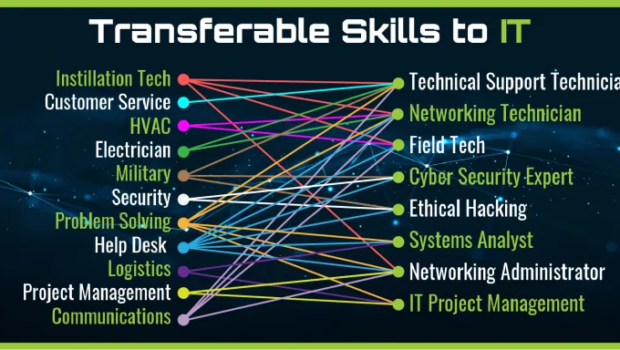5 Tips for Getting Into IT With Zero Experience
Whether you’re working a dead-end job or transitioning out of the military, everybody has different reasons to make the transition into the IT industry. And the timing couldn’t be better! The industry is facing a massive shortage of workers, offers great pay, amazing benefits, and lots of employment opportunities.

If you don’t have much experience, but you’re looking to join a Technology Career, don’t worry! You’re not the first. Check out our 7 tips for getting your foot in the door of the IT industry.
1. Re-examine and Apply Your Past Experience to the IT Industry
When you first make the decision to pursue a new career in IT, it’s important to take a hard look at your prior experience. It might seem like you have none of the skills listed on job postings, but soft skills can be surprisingly important and many skills are transferable into IT roles.
For example, if you’re looking to start in a help desk position (a common entry-level IT role), things like communication, customer service, familiarity with Microsoft Office, and other common skills can be a huge boost to your resume. By carefully thinking about your past roles through the lens of the role you’d like to get, you may find a treasure trove of relevant experience.
2. Get Industry Certifications
Getting certified may be the fastest way to break into information technology. While a tech degree can take 1-4 years, certifications can be studied for and earned in just a few weeks. Entry level certifications like the ITIL, CompTIA A+, Network+, and Security+ found in our entry level Computer User Support program, can lay the foundation for roles in networking and cyber security later in your career.
By getting certified, you’ll show potential employers that you have the skills they need. This can go a long way towards making up for a lack of experience. For some roles, the right certifications will put you higher in the stack than applicants with limited experience and no certifications. Best of all, certifications can help open up more entry-level opportunities instead of just taking the first IT job that comes your way.
3. Be Open to Starting at the Bottom
It’s important to note that you may have to “start over” in IT. You may have been a manager or an advanced professional in your old industry, but you’re leaving it for a reason! Be prepared to start with a lower level position and work your way up. The experience you get working at the bottom of the ladder will be valuable as you grow into a more challenging position.
Don’t worry too much though, the earning potential you will have in IT is only limited by the work you put in. On the low-end, you are looking at starting out right around 40k in a help desk position, within 5 years in the industry and a couple of cyber security certifications you could be looking at around 65k minimum in a Cyber Security Analyst role. It really depends on your willingness to move forward and the extra learning time you put in to master your craft.
4. Teach Yourself Relevant Tech Skills
When it comes to technology, there are a million different things to learn that can improve your resume. Anything from understanding Salesforce to knowing how to post on WordPress might be useful to your next employer. Utilizing YouTube and learning from countless free videos is a great way to learn new skills and reinforce old ones.
Follow your interests and teach yourself about software and hardware in your free time. You’ll be able to add these skills to your resume once you’re competent at them, and they just might make the difference between getting hired and getting looked over.
If you feel like you don’t have all the necessary tech skills to become a developer, a good option would be to consider entry-level roles (botch tech and non-tech) in the same tech company, so you still will get to work directly alongside developers and learn from them. Let’s say, if you decide to start looking for roles as a sales development representative, and then transition into becoming a developer, nothing would be more beneficial in the early stages of a career than good tech sales training (a good example is Uvaro tech sales training school).
5. Look for Crossover Positions
While you might not have any direct experience, there are IT workers in every industry that use networks and computers (pretty much every industry out there). If you have years of experience in car sales, for example, it might help to look for an IT position at a car dealership. Understanding half of the business can go a long way towards making you a valuable employee right from the start, even if your tech skills aren’t top notch. You’ll still have to start at the bottom, but it could be the perfect way to gain your first year or two of IT experience.
All in all, it is not impossible to start a career in IT with no experience, hence the word “start,” but many individuals are still skeptical of making the leap into IT. By arming yourself with the right tools and knowhow you can significantly increase your chances at starting a career in tech that will last a lifetime.

















